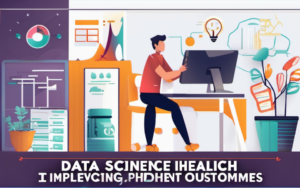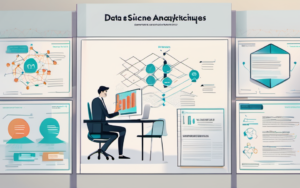The transformative power of Data Science is reshaping the business landscape, enabling organizations to make informed decisions, optimize operations, and drive growth. With the exponential growth of data, businesses are increasingly leveraging data science techniques to extract valuable insights and gain a competitive advantage. This article explores the profound impact of data science on business performance, examining its key applications, benefits, challenges, and future trends.
The Rise of Data Science
Data science has emerged as a critical discipline in the digital age, driven by the availability of massive datasets and advancements in computational power. It encompasses a wide range of techniques, including statistical analysis, machine learning, and data visualization, to extract meaningful insights from raw data. This ability to unlock hidden patterns and predict future outcomes has revolutionized how businesses operate and make decisions.
Importance of Data-Driven Decision Making
In today’s competitive market, businesses need to be agile and responsive to changing customer needs and market trends. Data-driven decision making allows organizations to make more informed choices based on evidence rather than intuition or guesswork. By leveraging data science, businesses can gain a deeper understanding of their customers, optimize their operations, and identify new opportunities for growth.
Key Applications of Data Science in Business
Data science has a wide range of applications across various business functions, enabling organizations to enhance their efficiency, effectiveness, and competitiveness.
Customer Analytics
Data science plays a crucial role in understanding customer behavior, preferences, and needs. By analyzing customer data, businesses can personalize their marketing campaigns, improve customer service, and develop products and services that meet their specific demands. For instance, companies can use data science to identify customer segments, predict churn, and recommend relevant products or services.
Operations Optimization
Data science can be used to optimize various business operations, such as supply chain management, inventory control, and production planning. By analyzing operational data, businesses can identify bottlenecks, improve efficiency, and reduce costs. For example, data science can be used to forecast demand, optimize delivery routes, and streamline manufacturing processes.
Marketing and Sales
Data science techniques like predictive modeling can help businesses target the right customers with the right message at the right time. By analyzing customer data, businesses can personalize marketing campaigns, identify potential leads, and predict sales conversions. Data-driven insights can also help businesses optimize pricing strategies and improve sales performance.
Financial Forecasting
Data science can be used to forecast financial performance, identify potential risks, and make better investment decisions. By analyzing historical financial data and economic indicators, businesses can develop more accurate financial models and gain a clearer view of their future financial outlook.
Risk Management
Data science techniques can be used to identify and assess risks, such as fraud detection, credit risk management, and cyber security. By analyzing data patterns and anomalies, businesses can develop more effective risk mitigation strategies and reduce potential losses.
Benefits of Implementing Data Science
The benefits of implementing data science are numerous and can significantly impact business performance.
Improved Decision Making
Data science empowers businesses to make more informed and data-driven decisions. By analyzing data, organizations can gain a deeper understanding of their customers, markets, and operations, leading to better strategies and outcomes.
Enhanced Customer Experience
Data-driven insights enable businesses to personalize their offerings and provide a more tailored customer experience. By understanding customer preferences and behavior, businesses can deliver relevant products, services, and communication, leading to increased customer satisfaction and loyalty.
Increased Efficiency and Productivity
Data science can optimize various business processes, leading to increased efficiency and productivity. By identifying bottlenecks and areas for improvement, businesses can streamline operations, automate tasks, and reduce costs.
Competitive Advantage
Data science can provide businesses with a competitive advantage by enabling them to make better decisions, optimize their operations, and gain a deeper understanding of their customers and markets. By leveraging data-driven insights, businesses can outmaneuver their competitors and achieve greater success.
Revenue Growth and Profitability
Data science can contribute to revenue growth and profitability by driving customer acquisition, improving customer retention, and optimizing operations. By analyzing data, businesses can identify new opportunities for growth, increase sales, and reduce costs.
Challenges and Considerations
While data science offers numerous benefits, businesses also need to be aware of the challenges and considerations associated with its implementation.
Data Quality and Integrity
The quality and integrity of data are critical for the accuracy and reliability of data science insights. Businesses need to ensure that their data is accurate, complete, and consistent to avoid drawing misleading conclusions.
Data Security and Privacy
Data security and privacy are paramount concerns in the age of big data. Businesses need to implement robust security measures to protect sensitive customer data and comply with relevant privacy regulations.
Skill Gap and Talent Acquisition
Data science requires specialized skills and expertise. Businesses need to bridge the skill gap by investing in training programs and recruiting qualified data scientists.
Ethical Considerations
Data science raises ethical considerations, such as bias in algorithms, data privacy, and the potential for misuse of data. Businesses need to develop ethical guidelines and ensure that their data science practices are responsible and fair.
Case Studies and Examples
Numerous businesses have successfully implemented data science to improve their performance and gain a competitive advantage.
Success Stories of Data Science Implementation
Amazon uses data science to personalize product recommendations, optimize pricing, and forecast demand. Netflix leverages data science to recommend movies and TV shows to its subscribers based on their viewing history and preferences.
Real-World Applications and Impact
Data science has been used to improve healthcare outcomes, optimize logistics, and even predict natural disasters. These real-world applications demonstrate the transformative power of data science across various industries.
Future Trends and Innovations
The field of data science is constantly evolving, with new technologies and trends emerging regularly.
Artificial Intelligence and Machine Learning
Artificial intelligence (AI) and machine learning (ML) are playing an increasingly important role in data science. AI algorithms can analyze vast amounts of data and identify complex patterns, enabling businesses to make more informed decisions.
Big Data Analytics and Cloud Computing
Big data analytics and cloud computing are enabling businesses to process and analyze massive datasets at scale. Cloud-based data science platforms provide businesses with access to powerful computing resources and tools for data analysis.
Data Visualization and Storytelling
Data visualization and storytelling are becoming increasingly important for communicating data insights to stakeholders. Businesses need to effectively present data findings in a clear and compelling way to drive action and decision-making.
Summary of Key Findings
Data science has a profound impact on business performance, enabling organizations to make better decisions, optimize operations, and drive growth. By leveraging data science, businesses can gain a deeper understanding of their customers, markets, and operations, leading to improved efficiency, effectiveness, and competitiveness.
Importance of Data Science for Business Success
In today’s data-driven world, embracing data science is essential for businesses to thrive. By adopting a data-driven approach, businesses can unlock valuable insights, gain a competitive advantage, and achieve greater success.
Call to Action for Data-Driven Transformation
Businesses need to prioritize data science initiatives and invest in the necessary resources to harness the transformative power of data. By embracing data-driven decision making, businesses can unlock their full potential and thrive in the digital age.




